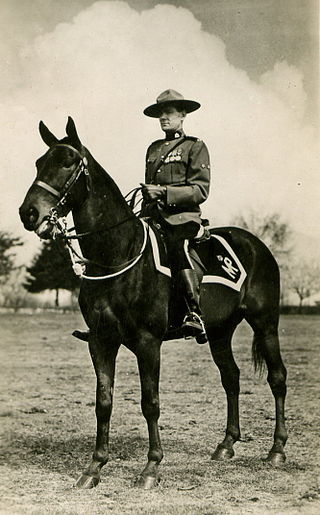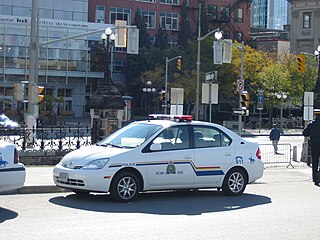Related Research Articles

The Front de libération du Québec (FLQ) was a militant Quebec separatist group which aimed to establish an independent and socialist Quebec through violent means. It was considered a terrorist group by the Canadian government. Founded sometime in the early 1960s, the FLQ conducted a number of attacks between 1963 and 1970, which totaled over 160 violent incidents and killed eight people and injured many more. These attacks culminated with the Montreal Stock Exchange bombing in 1969 and the October Crisis in 1970, the latter beginning with the kidnapping of British Trade Commissioner James Cross. In the subsequent negotiations, Quebec Labour Minister Pierre Laporte was kidnapped and murdered by a cell of the FLQ. Public outcry and a federal crackdown subsequently ended the crisis and resulted in a drastic loss of support for the FLQ, with a small number of FLQ members being granted refuge in Cuba.

The Royal Canadian Mounted Police is the national police service of Canada. The RCMP is an agency of the Government of Canada; it also provides police services under contract to 11 provinces and territories, over 150 municipalities, and 600 Indigenous communities. The RCMP is commonly known as the Mounties in English.

The Canadian Security Intelligence Service is a foreign intelligence service and security agency of the federal government of Canada. It is responsible for gathering, processing, and analyzing national security information from around the world and conducting covert action within Canada and abroad. CSIS reports to the Minister of Public Safety, and is subject to review by the National Security and Intelligence Review Agency.
Terrorism and mass attacks in Canada includes acts of terrorism, as well as mass shootings, vehicle-ramming attacks, mass stabbings, and other such acts committed in Canada that people may associate with terroristic tactics but have not been classified as terrorism by the Canadian legal system.

The Emergencies Act is a statute passed by the Parliament of Canada in 1988 which authorizes the Government of Canada to take extraordinary temporary measures to respond to public welfare emergencies, public order emergencies, international emergencies and war emergencies. The law replaces the War Measures Act passed in 1914. It asserts that any government action continues to be subject to the Canadian Charter of Rights and Freedoms and the Canadian Bill of Rights.

William Leonard Higgitt was the 14th commissioner of the Royal Canadian Mounted Police (RCMP), holding office from 1969 to 1973, and President of the International Criminal Police Organization (Interpol) from 1972 to 1976. Leonard Higgitt's background in intelligence and counterintelligence with the RCMP during and after World War II made him the preferred choice as RCMP Commissioner at what was the height of the Cold War. Higgitt's tenure as Canada's top spy, first, and then as RCMP Commissioner, also coincided with the civil rights movement in the United States, which was part of a period of broader political unrest and social change in Canada, including the Quebec nationalist movement and first-ever diplomatic negotiations in Stockholm between Canada and Communist China. Higgitt's time as Commissioner was marked by his efforts to balance a traditional view of the Mounties in the eye of the public, and a trust in the RCMP attending that view, with more modern, high-tech, and legally complex policing methods, including surveillance and data-gathering practices that found the RCMP facing increasing media and judicial scrutiny.
Jean-Pierre Goyer, was a lawyer and Canadian Cabinet minister.
The Security Intelligence Review Committee was a committee of Privy Councillors that was empowered to serve as an independent oversight and review body for the operations of the Canadian Security Intelligence Service (CSIS). The SIRC was established in 1984 as a result of the reorganization of Canadian intelligence agencies recommended by the McDonald Commission investigating the illegal activities of the former RCMP Security Service.
The RCMP Security Service was a branch of the Royal Canadian Mounted Police (RCMP) that had responsibility for domestic intelligence and security in Canada. It was replaced by the Canadian Security Intelligence Service (CSIS) in 1984 on the recommendation of the McDonald Commission, which was called in the wake of major scandals during the 1970s.

Law enforcement in Canada is the responsibility of police services, special constabularies, and civil law enforcement agencies, which are operated by every level of government, some private and Crown corporations, and First Nations. In contrast to the United States or Mexico, and with the exception of the Unité permanente anticorruption in Quebec and the Organized Crime Agency of British Columbia, there are no organizations dedicated exclusively to the investigation of criminal activity in Canada. Criminal investigations are instead conducted by police services, which maintain specialized criminal investigation units in addition to their mandate for emergency response and general community safety.
Jack Hooper is the former deputy director of the Canadian Security Intelligence Service (CSIS) who became well known mainly for his role in some of Canada's most sensitive and controversial spy-service scandals, including CSIS's involvement in the case of Maher Arar, a Canadian engineer father of two who was sent to Syria where he was imprisoned without charges and tortured.

The Royal Canadian Mounted Police (RCMP) has a history dating back to 1873 and has been involved in several high-profile controversies.

This is a Bibliography of the Front de libération du Québec.
The following is a timeline of the FLQ, from the founding of the Front de libération du Québec (FLQ) in the early 1960s to the publishing of the enquiry commission reports in the 1980s.

In the ten days immediately following the September 11 attacks in the United States in 2001, the Royal Canadian Mounted Police (RCMP) initiated Project Shock which sought to quickly collect and act on any information or rumors related to possible threats posed by Muslims in Canada.

The decades following the Rebellions of 1837–1838 marked the start of intelligence services in Canada. Defeat in the failed uprising caused the restoration of colonial regimes and the reform of imperialism. As a result, informal intelligence services were formed to conduct certain activities. 1864 marked the formation of two secret police forces and the formal intelligence service in Canada. Created to protect the Canada–United States border, these organization were under the control of a Montreal police commander and political ally. In response to a number of raid and attacks connected with Irish nationalism, Prime Minister John A. Macdonald merged the two forces to form the Dominion Police (DP). The DP was subsequently merged with the North-West Mounted Police to form the Royal North-West Mounted Police in 1904 and the Royal Canadian Mounted Police (RCMP) in 1920.
Jean-Pierre Bonin was a judge in the Canadian province of Quebec.
The National Security and Intelligence Review Agency is an independent government agency organized to review all national security and intelligence activities carried out by the Government of Canada. NSIRA was established in June 2019 to replace the Security Intelligence Review Committee, which was limited to reviewing the activities of the Canadian Security Intelligence Service (CSIS).

The National Security Act, 2017 is a Canadian statute enacted by the Parliament of Canada to reform the oversight of the National Security Agencies of Canada, including the Royal Canadian Mounted Police (RCMP), Canadian Security Intelligence Service (CSIS) and the Communications Security Establishment (CSE). It also makes various adjustments to supporting legislation, including the National Defense Act, the Canadian Security Intelligence Service Act the Communications Security Establishment Act and the Criminal Code to support these new mechanisms.
The Public Order Emergency Commission, also known as the Rouleau inquiry or the Inquiry into Emergencies Act was a public inquiry in Canada that investigated the invoking of the Emergencies Act on February 14, 2022, by the government of Prime Minister Justin Trudeau during the Canada convoy protests. It was the first time the Emergencies Act had been invoked and it remained in place from February 14–23, 2022, the POEC investigated the rationale for invoking the Emergencies Act and the measures taken for dealing with the emergency". The inquiry was led by commissioner Justice Paul Rouleau, who was appointed by Prime Minister Justin Trudeau on April 25, 2022. Justice Rouleau had a surgical intervention which delayed the inquiry from September 19, 2022, to mid-October. The inquiry is independent of the parliamentary review committee.
References
- 1 2 Forcese, Craig; Roach, Kent (2015). False Security: The Radicalization of Canadian Anti-Terrorism. Toronto: Irwin Law. pp. 38–39. ISBN 978-1-55221-410-7.
- ↑ SIRC (2005). Reflections, Security Intelligence Review Committee, 2005, p. 7
- ↑ "Commission of Inquiry Concerning Certain Activities of the Royal Canadian Mounted Police". Library and Archives Canada. Retrieved 22 June 2022.
- ↑ "Commission of Inquiry Concerning Certain Activities of the Royal Canadian Mounted Police - second report, volume 2 : freedom and security under the law / D.C. McDonald, chairman". No. CP32-37/1981-2-2E-PDF. Privy Council Office. August 1981.
- ↑ "Commission of Inquiry Concerning Certain Activities of the Royal Canadian Mounted Police - Third report : Certain R.C.M.P. Activities and the Question of Governmental Knowledge / D.C. McDonald, chairman". Public Safety Canada. 2015-11-24.
- ↑ Holthuis 1991, p. 70.
- 1 2 Holthuis 1991, p. 71.
- ↑ Holthuis 1991, p. 73.
- ↑ Holthuis 1991, p. 74.